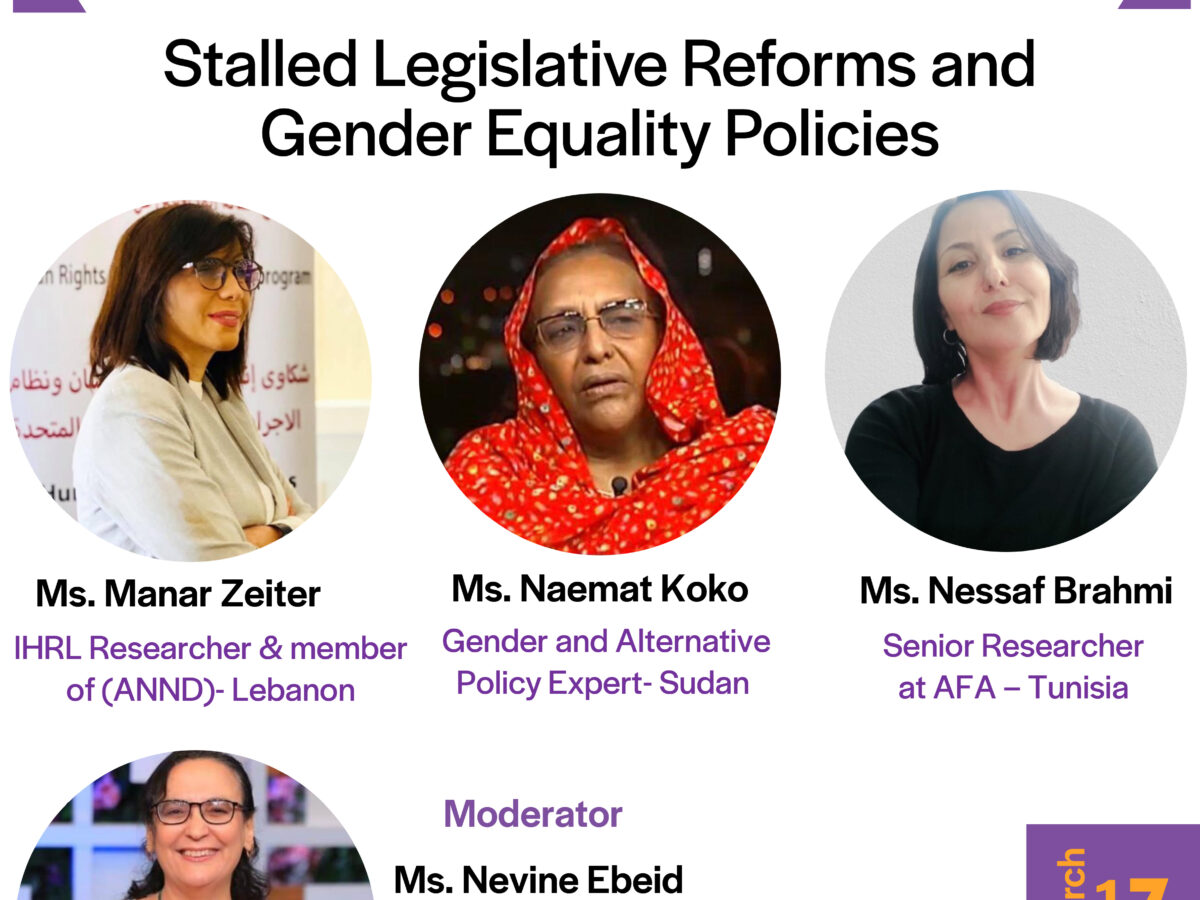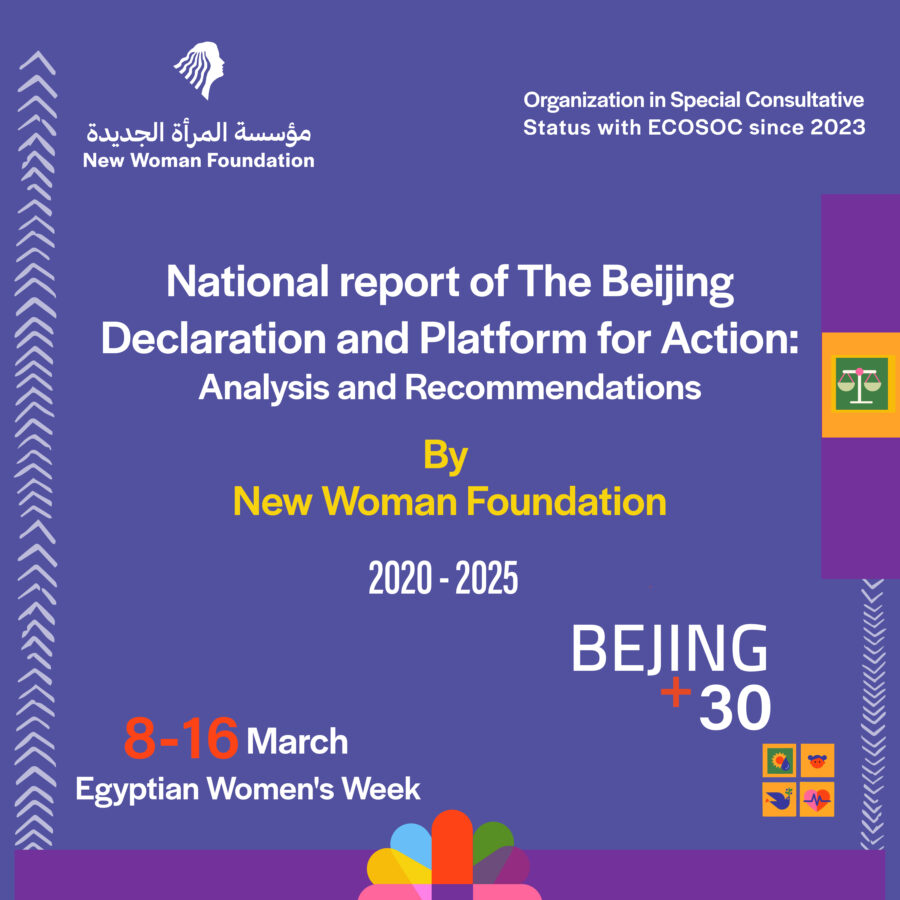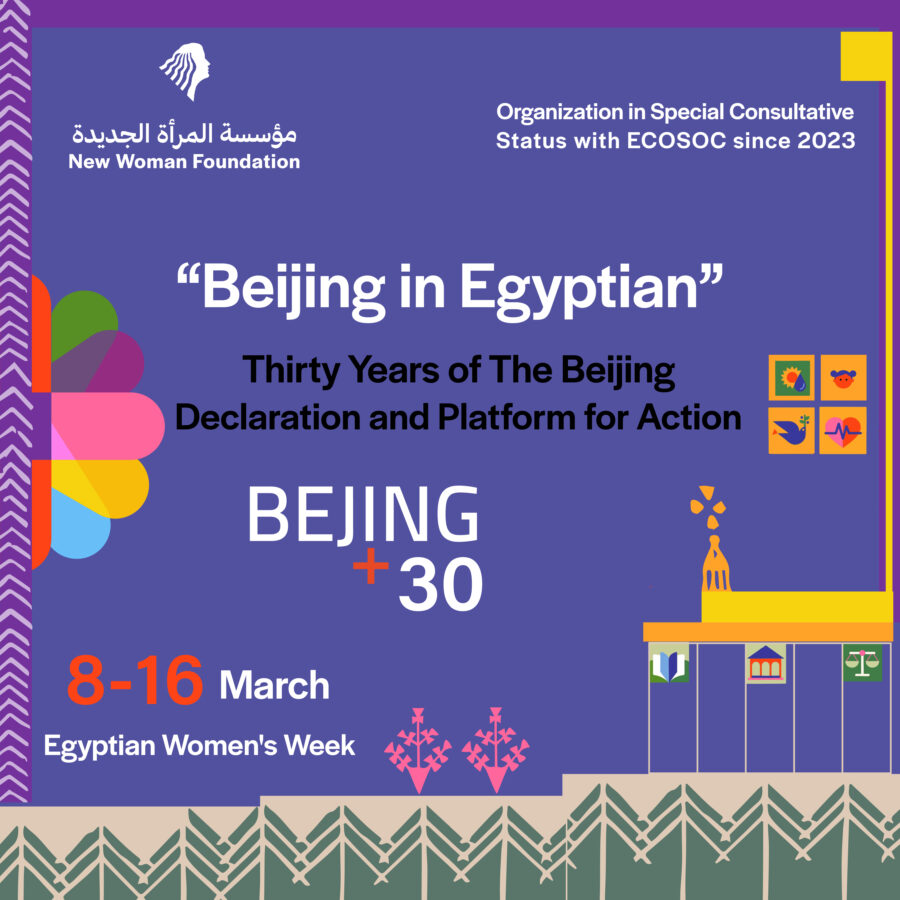- Contact Us
- 0020233382706
- nwrc@nwrcegypt.org
CSW 69 Virtual Event: Stalled Legislative Reforms and Gender Equality Policies
Promises kept; Promises broken: A review of the Latest Political Declaration from the 69th Session of the Commission on the Status of Women – Beijing +30
March 13, 2025Background Paper
Stalled Legislative Reforms and Gender Equality Policies
Beijing +30 Follow-ups
Introduction:
The Arab region ranks second after South Asia in terms of gender gap expansion. This gap is expected to widen further due to the increasing feminization of poverty and the restriction of public space and freedom of expression.
In this context, the Beijing +30 follow-ups on the status of women and gender equality highlight significant concerns. The regional report issued by ESCWA, according to the Muscat Declaration, notes that approximately one hundred Arab legislative enactments have been approved to empower women and achieve gender equality. Despite the political declaration recognizing the global achievements, numerous critical readings from feminist and human rights organizations at the regional level have raised concerns regarding the effectiveness of these measures.
The position statement “Stalled Legislative Reforms and Weak Gender Equality Policies” and the critical analysis “One Step Forward, Two Steps Back” addressed this issue. Both perspectives highlight the ongoing failure to implement impactful legislative reforms that protect women from the rising rates of feminized poverty, significantly reduce violence against women, and enhance women’s representation in decision-making positions. Often, regional governments achieve a relative increase in the number of women in leadership roles without this presence reflecting on tangible policy shifts toward more equity and partnership in political, economic, and societal decision-making.
Moreover, it is essential to acknowledge that the political, economic, and social conditions in Arab countries are not homogenous, making it hard to generalize women’s status across the region. Several factors further complicate the analysis, such as the increasing number of Arab countries experiencing armed conflicts, the regression of political freedoms following the setbacks of the Arab Spring revolutions, and the decline of democratic practices.
On a broader scale, the North African and Arab regions face rising poverty rates, particularly affecting women, which necessitates an urgent reassessment of poverty alleviation programs to determine their effectiveness in mitigating the growing marginalization and economic deprivation, especially given the increasing debt levels.
Additionally, the region is impacted by the rise of conservative right-wing ideologies in several northern countries. This shift exacerbates global inequalities and reinforces conservative discourses that further complicate the situation for marginalized groups, including women, in the Arab world.
Objectives of the Discussion:
- Provide an overview of gender equality in light of the Beijing +30 follow-ups.
- Focus on the status of women in conflict-affected countries.
- Establish preliminary priorities for intensified efforts over the next five years.
Speakers:
- Ms. Manar Zeiter: IHRL Researcher and Member of the Arab NGO Network for Development (ANND) – Lebanon.
- Ms. Naemat Koko: Gender and Alternative Policy Expert – Sudan.
- Ms. Nessaf Brahmi: Senior Researcher at the Arab Alternatives Forum for Studies – Tunisia.
- Moderator: Ms. Nevine Ebeid, New Woman Foundation.
Interventions
Ms. Manar Zeiter
A critical analysis of the regional report on gender equality.
Prospects for feminist advocacy regarding gender equality priorities in the next five years.
Ms. Naemat Koko
The response of Arab state policies to emerging conflicts in the region.
Strategies for a more effective response to the status of women in conflict zones and refugee-hosting countries.
Ms. Nessaf Brahmi
An assessment of Tunisian women’s conditions amid democratic transition challenges.
A vision for feminist movement priorities in Tunisia over the next five years.
Expected Recommendations from the Discussion:
- A preliminary outline of feminist action priorities to achieve gender justice in legislation and equal opportunity policies at both the official and grassroots feminist movement levels in the Arab world.
- Identify traditional and emerging challenges facing the feminist movement.
- Explore available opportunities to advance the proposed priorities.
Webinar Agenda
Ms. Nevine Ebeid – New Woman Foundation (10 minutes)
A brief overview of the Beijing +30 follow-up process and the interventions by the New Woman Foundation regarding the parallel national report and recent political declarations
Ms. Manar Zeiter – Lebanon (15 minutes)
A critical review of regional follow-up reports on women’s status in Arab countries
Ms. Naemat Koko – Sudan (15 minutes)
An assessment of regional policy responses to the situation of women in conflict zones and refugee-hosting countries.
Ms. Nessaf Brahmi – Tunisia (15 minutes)
An analysis of women’s status amid democratic transition challenges in Tunisia
Open Discussion (20 minutes)
Ms. Manar Zeiter – Lebanon (10 minutes)
A preliminary synthesis of feminist movement priorities and general reflections
Ms. Naemat Koko – Sudan (10 minutes)
Reflections on enhancing effective responses to the conditions of women in conflict zones and refugee-hosting countries, along with general remarks
Ms. Nessaf Brahmi – Tunisia (10 minutes)
Proposed priorities for the Tunisian feminist movement and concluding remarks
Duration: Two Hours
Time Zones
02 – 04 PM – New York
08 – 10 PM – Cairo /Lebanon
07- 09 PM – Tunis
09 – 11 PM – Uganda
Join the discussion, Zoom link: https://bit.ly/3Ftn7k6



